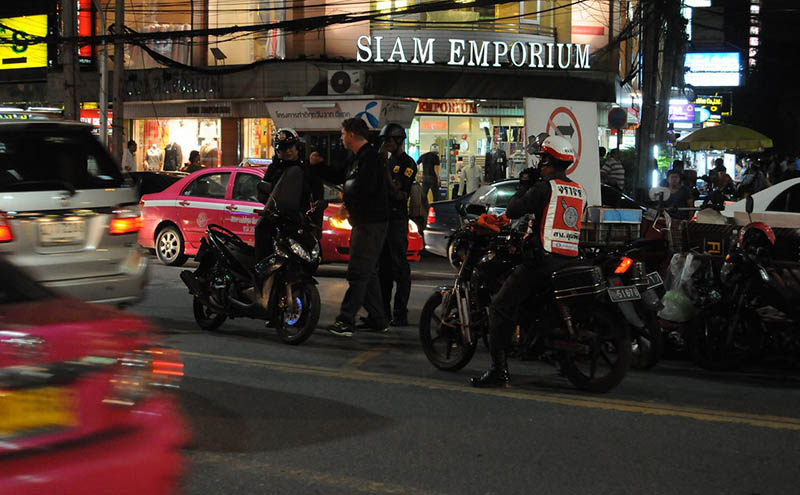The chief of Thonglor police on Friday denied that illegal street searches of foreigners are being conducted as complaints have surged in expat communities.
Col. Nitiwat Sansing said concerns over youth motorcycle gangs and elevated security before His Majesty the King’s birthday have led to stricter enforcement of the law when asked about the pattern of reported late-night detentions and searches being conducted by police, largely concentrated along Sukhumvit Road between Asoke intersection and Phrom Phong.
“It’s a preventative security measure in order to ensure national security and peacekeeping this month,” Nitiwat said, referencing Monday’s royal birthday and worries about dek waen street gangs.
He said top brass have ordered capital police to be extra vigilant.
His comments came in response to a growing chorus of complaints by expats and travelers about being stopped by police who demanded they submit to immediate urine tests and threatened them with heavy fines, jail time and deportation. Many who’ve complained said they were intimidated into paying tens of thousands of baht in bribes to be allowed on their way.
Find all episodes of The Coconuts Podcast.
A number of people reached out to a reporter with their story, but none was willing to go on the record, reducing the likelihood of an official response.
Nitiwat cited the dangers posed by teen motorbike racers, but teen racers don’t generally frequent the areas where the searches are allegedly taking place.
The chief conceded that the officers conducting stop-and-frisk checks are not stationed at checkpoints, but are randomly patrolling various streets and sois.
“They’re stationed for only about 30 minutes, then they move to find a new station somewhere else,” he said explaining that this is meant to cover as much ground as possible.
“We’re not just stopping foreigners. We’re stopping everyone that fits the bill,” he said. Nitiwat added that he was “concerned” about how police actions were being perceived by the public and promised to “look into” claims by foreigners.
He said he had not received any complaints and asked for information about the approximate times and locations said to be a problem.
“Maybe some of these police are not carrying out their duty with integrity,” he said.
Not a new problem
In late 2014, we reported on a surge in reported incidents of harassment, random searches, detention and intimidation that at the time suggested an organized campaign by police targeting tourists and foreign nationals.
Two months later, after high-ranking officials said they would investigate, the chief of Thonglor police station ordered his officers to end the practice, saying foreigners would no longer be stopped and searched without sufficient probable cause, as required under Thai law
Then-chief Col. Khajohnpong Jitpakpoom said regular patrol officers should not be conducting spot urine tests in the field, and testing for drugs could only be done at the station. Positive results should be followed by a second test at a hospital.
He said any searches must be made in public with two senior officers present, and even printed out materials in English to inform people of their rights.
Under the criminal code, the police cannot search anyone in public without probable cause. That means searches are only allowed when there is good reason to believe someone has something in their possession that is illegal, will be used to commit a crime or was obtained through commission of a crime.
Legal experts advised that anyone stopped use common sense and be aware they do have some rights, and always insist that a searching officer show that their hands are empty.
Women have the right to request female officers conduct the search, which probably means going to the station. If a urine test is demanded, everyone has the right to refuse on the street and insist it be conducted at the station or a clinic.
Foreigners should carry adequate documentation, including at least a photocopy of their passport, including the visa page.
In case police detain you or take you to the station, insist on calling your attorney – even if you don’t have one. You can also insist they contact your embassy.
As with police in any country, those detained are best served by remaining polite and not raising their voice.
Have a story you want to share with us on this topic? Contact Managing Editor Todd Ruiz.




